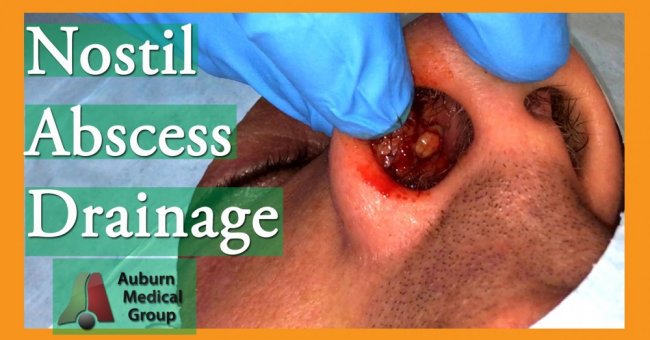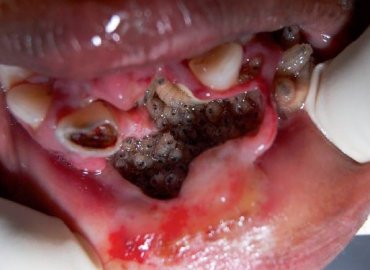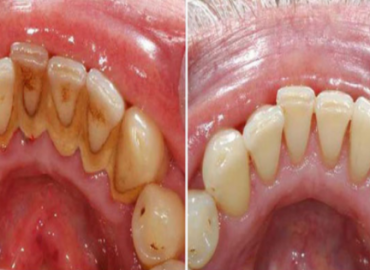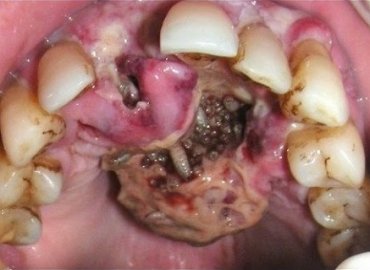A nostril abscess is drained with a simple incision. The culture grew Methicillin Resistant Staphylococus aureus (MRSA) which was treated with clindimycin because it had worked in resolving a recent infection of a household member.
What is Nasal Abscess?
An abscess is a pathological condition in which there is development of a cavity within the lining of tissues in which pus develops. This is usually caused by a bacterial infection. An abscess may be formed anywhere in the body. When there is an abscess formation in the nose, then it is termed as Nasal Abscess. A Nasal Abscess can form after a direct blow or trauma to the nose or may develop due to certain medical conditions like sinusitis.
A Nasal Abscess may cause an individual to have a hard time to breathe through the nose. There may also be pain felt in the nose. In some cases of Nasal Abscess, there may also be development of fever. The best way to treat Nasal Abscess is by way of antibiotics to get rid of the bacteria causing the condition and the pus that is formed is drained either through a needle or by making a small nick or cut at the site of the abscess and draining the pus out from the abscess. Diligent followup with the treating physician is necessary to ensure that the patient has completely cured from a Nasal Abscess.
What Causes Nasal Abscess?
As stated Nasal Abscess is mainly caused by bacterial infections, although certain viral infections, parasites, or infiltration of foreign substances within the nasal cavity along with a direct trauma or blow to the nose may all cause a Nasal Abscess. Once an injury of an infection has occurred and some sort of damage is done to the nasal area, the body’s defense mechanism acts up and sends white blood cells to repair the damaged area and fight off the infection. This causes pus which is made up of dead white blood cells, lymph fluid, and destroyed tissue and bacteria starts to accumulate resulting in collection of pus in the affected area resulting in pus formation causing Nasal Abscess.
What are the Symptoms of Nasal Abscess?
Some of the symptoms of Nasal Abscess:
- Nasal congestion.
- Cough.
- ever.
Sinus congestion. - In case of an infant having Nasal Abscess then severe irritability.
How is Nasal Abscess Diagnosed?
To begin with the patient will have to give a detailed history to the treating physician as to when the symptoms started and what has been the duration of the symptoms of nasal abscess. The patient will also have to inform whether there has been any injury or trauma to the nasal structures as of recent. A physical examination of the nasal area will then be conducted and the physician will check for the presence of any pus within the nostrils. Physician may also examine the mouth and pharynx to take a close look at them. Radiological studies of the nasal area will clearly show the presence of an abscess, thus confirming the diagnosis of Nasal Abscess.
How is Nasal Abscess Treated?
Antibiotics are the way to go for treating Nasal Abscess. The antibiotics may be started after the pus that has been formed in the abscess is drained either using a needle or making a small cut and draining out the pus. The pus is then sent for analysis in a laboratory where the offending bacterium is identified and the antibiotic best suited for that particular bacterium is then prescribed. It is necessary for the patient to complete the course of the antibiotics even after the symptoms have resolved in order to prevent any recurrences of a Nasal Abscess.
In some cases, where the location of the abscess is such that it is difficult for the needle to go to that location then the pus is drained surgically with the aid of a local anesthetic. If left untreated, the infection caused by Nasal Abscess can spread and cause certain serious medical complications, some of which may be quite serious. Hence, it is always advisable to contact a doctor for treatment if an individual suspects that he or she may have a Nasal Abscess.
There are cases where Nasal Abscess is caused by a variety of bacterium called methicillin resistant staphylococcus aureus or MRSA. This is a type of bacteria which is sensitive to many antibiotics and hence is a difficult condition to treat at least with an antibiotic. For such bacteria, stronger antibiotics are used like vancomycin but the most preferred treatment for MRSA is drainage of the abscess, so that the bacteria do not become resistant to more antibiotics and also to prevent recurrence of Nasal Abscess.







